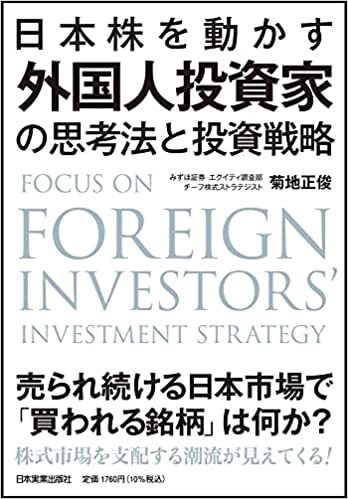Market structural reform of the Tokyo Stock Exchange disappointed foreign investors | ZUU online

This article is based on the author’s book “Foreign investors’ thinking and investment strategies that move Japanese stocks(Nippon Jitsugyo Publishing Co., Ltd.)
Importance of Shareholders Required by Foreign Investors
◉ Why is corporate governance important?
Most foreign investors believe that the owners of a joint-stock company are the shareholders, and that the management should maximize the value of the stock for the sake of the shareholders. And most Japanese companies are seen as insufficiently focused on shareholders.
In 2019, the Business Roundtable, an economic organization in which major companies participate in the United States, issued a statement that companies have a responsibility to bring economic benefits not only to shareholders but also to all stakeholders, including employees and local communities. has become a hot topic. It is understandable that companies like US companies, which have placed too much emphasis on shareholders, will change to place more emphasis on stakeholders. This has led to suspicions that weak Japanese companies may turn to disrespect for shareholders.
Regarding ESG, many foreign investors consider G (governance) to be the highest concept, and believe that E (environmental) and S (social) policies will not go well without good corporate governance.
I am worried that Japanese companies will use their emphasis on sustainability as a cover to weaken their stance of focusing on shareholders. We also request that climate change measures, including CO2 reductions, lead to improvements in corporate value.
◉ TSE market restructuring disappointing foreign investors
Foreign investors were disappointed in the market structural reforms implemented by the Tokyo Stock Exchange in April 2022 to transform the TSE 1st and 2nd sections, JASDAQ Mothers markets into prime, standard and growth markets. It became a situation of the maxim “Mt.
The market capitalization of circulating stocks required to transition to the prime market was 10 billion yen, which was too loose a standard for foreign investors trading US stocks with a market capitalization of 100 trillion yen. Although the standards were originally loose, they were allowed to move to the prime market if they submitted a “conformity plan” to achieve the plan even if they did not meet the standards. ” was submitted.
If a company with a market capitalization of circulating stocks slightly less than 10 billion yen is aiming for the prime market, it is understandable that the market capitalization of circulating stocks (as of the end of June 2021, the base date) Companies that used to be yen also chose the prime market. Despite years of sluggish business performance, there were quite a few companies that achieved a market capitalization of 10 billion yen in the near future by applying a V-shaped recovery in business performance and a high PER that is far from the market average. Since the Tokyo Stock Exchange did not specify the deadline for achieving the prime standard, some companies set the target year to be 2030.
Companies that do not meet the criteria will have their TOPIX composition ratio reduced in 10 stages every quarter from the end of October 2022 and will be excluded on the last business day of January 2025. However, before that, in October 2022, A two-step relief measure, in which the second decision after June 2021 will be made, and companies that have achieved a market capitalization of 10 billion yen or more and a trading value turnover rate of 0.2 or more in October 2023 will be re-weighted. There is also The Tokyo Stock Exchange has taken the stance of rewarding companies that have made efforts to restore market capitalization of circulating stocks, but it was seen by foreign investors as too gentle a relief measure.
◉The impact of the revised Corporate Governance Code on market selection is limited
The revised Corporate Governance Code in 2021, which requires high governance for companies transitioning to Prime, was expected to deter prime transitions, but the impact has been limited.
The high governance system required of companies listed on the prime market is (1) use of a voting platform for institutional investors, (2) disclosure and provision in English, and (3) TCFD (Task Force on Climate-related Financial Disclosures). (4) Appointment of one-third or more independent outside directors; (5) Appointment of a majority of independent outside directors to the Nomination and Compensation Committee
However, to put it in extreme terms, it may be possible to translate disclosure materials into English using Google Translate, and for TCFD, if you pay a few million yen to a consulting company, they will write a simple TCFD for you.
As of April 15, 2022, the number of Japanese companies and organizations that have expressed their support for the TCFD was 800, the highest in the world. Many companies did not clarify It would be easy to increase the number of independent outside directors by asking a lawyer or a certified public accountant who is an acquaintance of the president.
On the other hand, President Hideharu Nagahisa of Yuken Kogyo was praised for his remark in a television program that he chose the standard market in consideration of the compliance and personnel costs required to meet the prime standards. It would be better for both shareholders and employees to use the expenses paid to consultants and outside directors for research and development expenses and employee wage increases.
Since the Corporate Governance Code is “Comply or Explain,” an emerging Internet company may explain, “Our company has low CO2 emissions, so there is no need to disclose the TCFD.” European investors who are sensitive to environmental issues will argue that the indirect CO2 emissions should be high because they consume a lot of electricity.
◉Corporate governance reform in Japan is “Too Small & Too Slow”
Foreign investors see Japan’s corporate governance reforms as “Too Small & Too Slow.” When corporate governance reforms began under Abenomics, there were expectations that governance reforms would be implemented more speedily and drasticly. This is one of the reasons why I turned to selling Japanese stocks after the middle of the year.
The TSE’s market structural reforms can be called “Too Small” when the market capitalization of circulating stocks in the prime market is no more than 10 billion yen, and “Too Slow” when a “suitable plan” is approved until 2030. A typical example. Some foreign investors have pointed out that the prime market of 1,841 companies is too many, and that a prime market should be created and narrowed down to at least 500 companies, like the US S&P 500.
Regarding the revision of the Corporate Governance Code, when QUICK conducted a questionnaire survey of domestic market participants (institutional investors and securities companies) in June 2021, 78% of the market participants answered that they “appreciate” or “somewhat appreciate.” and only 10% of market participants said they were either “not very” or “not at all”.
Ryohei Yanagi, former CFO of Eisai, conducted the Global Investor Survey for 15 years until his retirement in June 2022. Opinions that they are very dissatisfied with the corporate governance of Japanese companies have halved from 21% in 2012 to 11% in 2022, but about 60% of investors still think they are dissatisfied. About three-quarters of investors were also dissatisfied with ROE. The evaluation of Japan’s corporate governance reforms is diametrically opposed between those involved in the domestic market and foreign investors.
◉ Japan ranks 5th in corporate governance in Asia
According to “CG Watch 2020” (508 pages in English) of ACGA (Asian Corporate Governance Association), which is a member of institutional investors who invest in Asian stocks, Japan’s corporate governance ranking in Asia is 5th out of 12 countries ( same rate as Malaysia). 1st place was Australia, 2nd place was Hong Kong and Singapore with the same rate, the lowest was Indonesia, and the booby maker was the Philippines. Japan’s ranking rose from 7th in 2018 to 5th. It is true that Japan’s corporate governance reforms are progressing, but other Asian countries are also making efforts, so Japan’s relative ranking has not improved much.
(1) Although Japan has made progress in developing soft laws such as the Corporate Governance Code, it has lagged behind in developing hard laws such as the Companies Act; 3) Reasons for the low evaluation include insufficient disclosure of climate change-related information by companies.
Headquartered in Hong Kong, ACGA has 110 participating companies, 80% of which are institutional investors, with total assets under management reaching $36 trillion (4,700 trillion yen). Participation in ACGA requires an annual entry fee of at least $10,000. Some Japanese financial authorities have pointed out that the ACGA’s evaluation is biased, but since major asset management companies from Europe and the United States also participate in the ACGA, if the ACGA does not become more evaluated, foreigners Investors’ investment in Japanese stocks will not thrive.

Masatoshi Kikuchi
Mizuho Securities Equity Research Department Chief Equity Strategist. After graduating from the Faculty of Agriculture, University of Tokyo in 1986, joined Daiwa Securities, Daiwa Institute of Research, and Merrill Lynch Japan Securities in 2000 before taking up his current position in 2012. MBA from Cornell University in 1991. He is a Chartered Member of the Securities Analysts Association of Japan and a CFA Association Certified Securities Analyst. He is Nikkei Veritas Strategist Ranking 1st in 2017-2020 and 2nd in 2022.
His publications include “The Impact of Carbon Zero”, “The Impact of Activists” (Chuokeizai-sha), “How to Make Money in U.S. Equity Investments and How to Think”, “How to Read and Make Money with Stock Indexes that Move the Market”, and “Japan”. How to make money and ideas for foreign investors who move stocks” (Nippon Jitsugyo Publishing Co., Ltd.), “Good shareholders, bad shareholders”, “Conditions for foreign investors to buy Japanese stocks”, “Equity investment, the new normal in the low-growth era” (Nihon Keizai Shimbun Publishing Co., Ltd.), “Why is it time to invest in long-term Japanese stocks now?” , “Money flow has changed so much! “Foreign Investors” (Yosensha), “Companies Buying/Selling by Foreign Investors”, “M&A Strategy by TOB/Company Split”, “Corporate Valuation Revolution” (Toyo Keizai Inc.), His translations include “The Cost of Capitalism” (Yosensha) and “Management that Utilizes the Cost of Capital” (Toyo Keizai Inc.).
*Click the image to go to Amazon
Used by 4 million people including business owners and wealthy people
Get the latest information on the financial industry via e-mail newsletter
You can try up to 3 carefully selected paid articles per month
